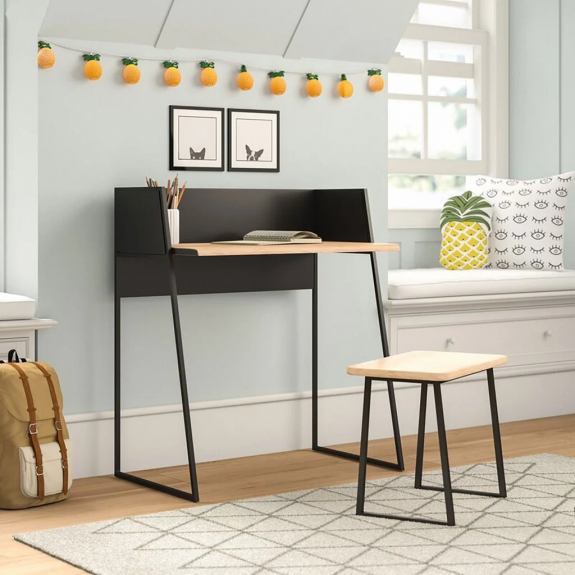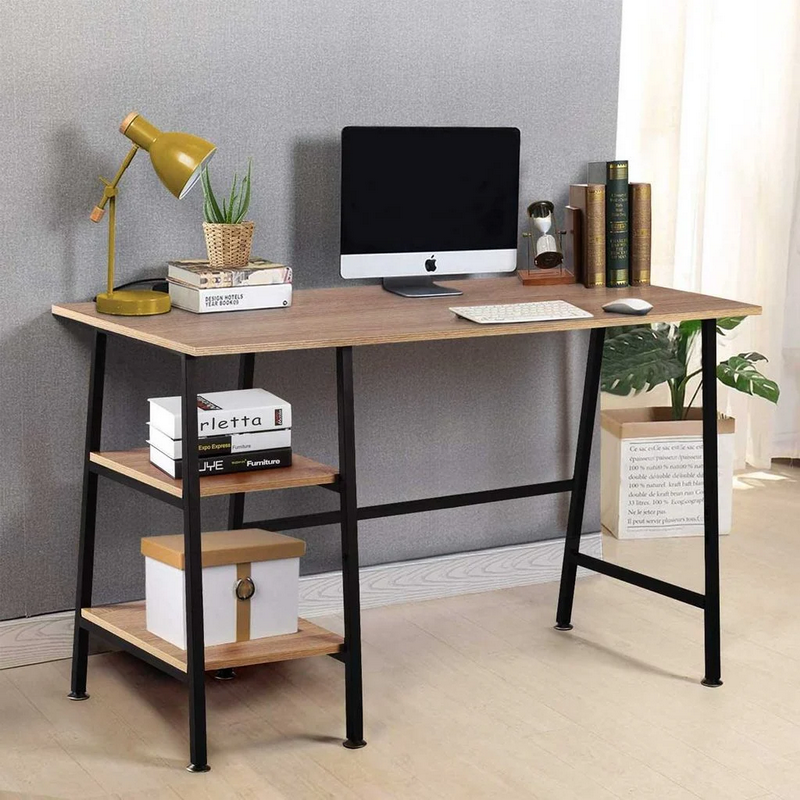In today's fast-paced world, many people find themselves working from home or in small office environments. This shift has made the need for efficient and stylish office desks for small spaces more important than ever. A well-chosen desk can enhance productivity, provide comfort, and fit seamlessly into your living area. In this article, we will explore the best office desks for small spaces, considering various styles, functionalities, and price points.
Understanding the Importance of Choosing the Right Desk
When selecting an office desk for a small space, several factors come into play. The desk must fit comfortably in the available space without overwhelming the room. A desk that is too large can make a small area feel cramped, while one that is too small may not provide enough workspace for your needs. Additionally, the desk should accommodate your work needs, whether for a computer, paperwork, or creative projects.
Style is also a crucial consideration; the desk should complement your existing decor and reflect your personal style. A well-designed desk can serve as a focal point in your workspace, enhancing the overall aesthetic of the room. Furthermore, storage is an essential aspect to consider. Desks with built-in storage can help keep your workspace organized and clutter-free, allowing you to focus on your tasks without distractions.

Types of Office Desks for Small Spaces
1. Wall-Mounted Desks
Wall-mounted desks are an excellent choice for small spaces. They can be folded away when not in use, freeing up floor space. These desks often come with shelves or compartments for storage, making them both functional and stylish. The ability to mount a desk on the wall allows you to utilize vertical space effectively, which is often underused in small rooms.
Pros:
- Space-saving design: Wall-mounted desks can be installed at any height, allowing you to customize your workspace to your needs.
- Easy to install: Most wall-mounted desks come with straightforward installation instructions, making it easy for anyone to set up.
- Versatile for various uses: These desks can be used for work, study, or even as a small crafting area.
Cons:
- Limited workspace: Depending on the design, wall-mounted desks may not provide enough surface area for larger tasks.
- Requires wall support: Proper installation is crucial to ensure the desk can support the weight of your equipment.
2. Corner Desks
Corner desks utilize the often-overlooked corners of a room, providing ample workspace without taking up too much floor area. They can be L-shaped or triangular, fitting snugly into the corner. This design not only maximizes the available space but also creates a cozy nook for productivity.
Pros:
- Maximizes corner space: Corner desks can transform an unused area into a functional workspace.
- Provides more surface area: Many corner desks offer a larger work surface compared to traditional desks of the same width.
- Often includes storage options: Many models come with built-in shelves or drawers, helping to keep your workspace organized.
Cons:
- May not fit all room layouts: The effectiveness of a corner desk depends on the room's layout and available space.
- Can be less accessible than traditional desks: Depending on the design, accessing the far side of a corner desk may be inconvenient.
3. Compact Desks
Compact desks are designed specifically for small spaces. They are typically smaller in size but still offer enough surface area for a laptop and essential office supplies. Many compact desks come with additional features like drawers or shelves, making them a practical choice for those with limited space.
Pros:
- Ideal for tight spaces: Compact desks are perfect for apartments or small home offices where every inch counts.
- Often lightweight and portable: Many compact desks can be easily moved, allowing for flexibility in your workspace arrangement.
- Variety of styles available: From modern to traditional designs, there are compact desks to suit any aesthetic.
Cons:
- Limited workspace: While compact desks are functional, they may not provide enough room for multiple monitors or extensive paperwork.
- May lack storage options: Some compact designs prioritize size over storage, which can be a drawback for those needing extra space for supplies.
4. Standing Desks
Standing desks are becoming increasingly popular, especially for those who want to reduce the health risks associated with prolonged sitting. Many models are adjustable, allowing users to switch between sitting and standing. This flexibility can enhance comfort and productivity, making it a great option for small spaces.
Pros:
- Promotes better posture: Standing desks encourage users to maintain a healthier posture, which can reduce back pain and improve overall well-being.
- Adjustable height options: Many standing desks can be easily adjusted to suit different users or preferences.
- Can be compact and stylish: Many modern standing desks are designed to fit seamlessly into small spaces without sacrificing style.
Cons:
- May require additional accessories (e.g., anti-fatigue mats): To maximize comfort while standing, additional accessories may be necessary.
- Can be more expensive than traditional desks: The technology and design of standing desks can lead to higher prices.
5. Multi-Functional Desks
Multi-functional desks serve more than one purpose, such as combining a desk with a bookshelf or a dining table. These desks are perfect for small apartments where space is at a premium. By combining functions, you can maximize the utility of your furniture without overcrowding your space.
Pros:
- Versatile use: Multi-functional desks can adapt to various needs, making them ideal for those who work from home and need a flexible workspace.
- Saves space by combining functions: By integrating multiple uses into one piece of furniture, you can free up additional space for other activities.
- Often stylish and modern: Many multi-functional desks feature contemporary designs that can enhance your decor.
Cons:
- May compromise on desk space: Combining functions can sometimes lead to a smaller workspace than a dedicated desk.
- Can be more expensive due to added features: The versatility of multi-functional desks can come at a higher price point.

Top Picks for Office Desks for Small Spaces
1. IKEA Micke Desk
The IKEA Micke desk is a minimalist option that offers a clean design with a spacious drawer for storage. Its compact size makes it perfect for small rooms, and it can be paired with other Micke pieces for a cohesive look. The desk's simple lines and neutral colors allow it to blend seamlessly into various decor styles, making it a versatile choice for any home office.
2. West Elm Mid-Century Mini Desk
This stylish desk features a mid-century design with a small footprint. It provides enough space for a laptop and essential items while adding a touch of elegance to your workspace. The rich wood finish and tapered legs give it a classic look, making it a beautiful addition to any small office or study area.
3. Tangkula White Corner Desk
The Tangkula corner desk is designed to fit snugly into any corner, maximizing space. It features a sleek design and is perfect for those who need a dedicated workspace without sacrificing style. The white finish brightens up the room, and the open design allows for easy access to all your work materials.
4. Sand & Stable Sessimore Leaning Ladder Desk
This leaning ladder desk is perfect for small spaces, offering a unique design that combines a desk with shelving. It provides ample storage while keeping the floor area open. The ladder-style design adds a modern touch, and the shelves can be used to display books or decorative items, making it both functional and aesthetically pleasing.
5. Room & Board Slim Desk
The Room & Board slim desk is a modern option that offers a simple design with a solid wood frame. It's perfect for those who want a sturdy desk without taking up too much space. The minimalist design allows it to fit into various decor styles, and the quality craftsmanship ensures durability for years to come.
Tips for Maximizing Your Small Office Space
1. Choose the Right Location: Position your desk near natural light to enhance productivity and create a pleasant working environment. Natural light can improve mood and energy levels, making it easier to focus on tasks.
2. Use Vertical Space: Incorporate shelves above your desk to store books and supplies, keeping the desk surface clear. Vertical storage solutions can help you make the most of limited floor space while keeping essential items within reach.
3. Keep It Organized: Use organizers and storage solutions to minimize clutter and maintain a tidy workspace. A clean and organized desk can boost productivity and reduce stress, allowing you to concentrate on your work.
4. Personalize Your Space: Add personal touches like plants, artwork, or decorative items to make your workspace inviting. Personalizing your desk can create a more enjoyable work environment and inspire creativity.
5. Consider Mobility: If you need flexibility, look for desks on wheels or those that can be easily moved. A mobile desk allows you to rearrange your workspace as needed, adapting to different tasks or activities.
Conclusion
Finding the right office desk for small spaces can significantly impact your productivity and comfort. Whether you prefer a wall-mounted desk, a compact design, or a multi-functional piece, there are plenty of options available to suit your needs. By considering the factors outlined in this article, you can create a functional and stylish workspace that enhances your work-from-home experience.
Frequently Asked Questions
1. What size desk is best for a small space?
- A desk that is 30-48 inches wide and 20-30 inches deep is typically ideal for small spaces. This size provides enough surface area for a laptop and essential items without overwhelming the room.
2. Are wall-mounted desks sturdy enough for a computer?
- Yes, most wall-mounted desks are designed to support the weight of a computer and other office supplies when properly installed. It's essential to follow the manufacturer's instructions for installation to ensure stability.
3. Can I use a dining table as an office desk?
- Yes, a dining table can serve as an office desk, especially if it fits your space and provides enough surface area for your work needs. Just ensure that it is at a comfortable height for prolonged use.
4. What is the best material for a small desk?
- Wood and metal are popular choices for small desks due to their durability and aesthetic appeal. Wood offers a warm, classic look, while metal can provide a modern, industrial feel.
5. How can I make my small desk more functional?
- Use organizers, add shelves, and keep only essential items on the desk to maximize functionality and minimize clutter. Consider using cable management solutions to keep cords tidy and out of the way.





